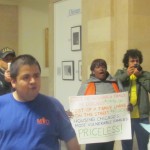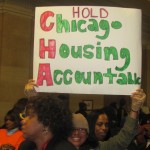DEFINITIONS
HUD: Housing Urban Development; the federal department in charge of assuring affordable housing throughout the country in cooperation with local government.
CHA: Chicago Housing Authority; the local governmental power which translates HUD regulations into city policies.
Loan Servicer: The person in charge of each HUD building and unit; tenants should find out who the loan servicer for their building is for problems like repairs.
Occupancy Specialist: The person assigned to each building/unit who deals with recertification and transfer requests.
This sheet covers federal government HUD programs. Anyone living in public housing projects or holding a city certificate should be counseled using the CHA Tenants Handbook – although be aware that HUD has recently taken over some public buildings and the old rules will not apply (in many cases the rent is increased).
1) Section 221 and 236: Under these programs, properties are privately owned by for-profit owners or non-profit organizations. In return for government subsidies, owners place limits on the rents as well as the income of entering tenants.
2) Project-based Section 8: The owner of the building is paid by HUD to maintain his units at an “affordable” rent. HUD provides a loan to the owner with a limited payback plan and at a below market interest rate. The subsidy is tied to the property, so only the current tenant in the unit receives the subsidy.
PREPAYMENT & PRESERVATION
Many buildings under Sections 221, 236, or 8, which signed contracts 10-20 years ago, are now coming up for prepayment, which means that the owners can take out loans from independent lenders and therefore raise the rents; many tenants will call in panic, realizing that their rent ceiling has disappeared. The landlord must give a 60-day notice if the building is approved for prepayment.
3) Tenant-based Section 8: Tenants with Section 8 certificates or vouchers receive assistance in paying rent but are able to choose to some extent where they live. Typically, the household pays 30% of income toward rent.
a) Certificates: Using a HUD certificate, the tenant pays exactly 30% of adjusted income in a HUD-approved unit. The tenant must report any changes in income so that the rent contribution changes accordingly.
b) Vouchers: Tenants with HUD vouchers receive a fixed amount of government subsidy to be used in any unit meeting HUD quality standards. This flexibility allows the tenants to spend more or less than 30% of income for housing.
HOW HUD REGULATIONS FIT INTO THE ORDINANCE
VACATING AN APARTMENT
Moving: Tenants can only move if family size changes or if apartment is irreparably damaged {severe and verifiable health problems can also be a reason}. If the management refuses a transfer, the tenant can file a grievance and be granted a hearing by HUD. If the tenant has a voucher and wishes to move, the tenant’s local contact person or occupancy specialist is responsible for providing the correct paperwork.
Evictions: A tenant cannot be evicted without definite cause, either nonpayment of rent or extreme proof of negligent damage. HUD tenants must receive a 14-day rather than a 5-day notice for non-payment of rent. Termination of tenancy based on an alleged violation of the lease requires the same 10-day notice. If the tenant wishes to fight an eviction, a grievance should be sent to the management as well as to HUD requesting a hearing, and LAF should be contacted.
RENT
The amount of rent charged to each HUD tenant is different, since it is based on income. Tenants must report any change in income, and the management company or landlord is then responsible for sending a notice of rent change; the time line on this process will vary according to the building’s house rules and regulations.
Late Rent: If a tenant’s public assistance check arrives late, he/she should notify both the landlord/management and the social worker. It is a good idea to suggest that the tenant receive checks at a currency exchange, where proof of receipt can be obtained. The tenant has three days from receipt of the check to pay rent.
Repairs: If the tenant has had no luck obtaining needed repairs through management, the tenant’s loan officer should first be informed of the problem {although city inspectors can also be called}. Only after these two steps have been followed should a tenant use a 14-day notice.
Security Deposits: The security deposit should always equal the tenant’s rent; if the rent changes, so will the security deposit, although if rent decreases, no part of the original deposit will be returned. The tenant’s occupancy specialist can help with security deposit disputes.
Guests: Management CAN bar guests from visiting, as they must all check in at the desk, but a tenant can choose to fight a decision by getting a lawyer (LAF).
Landlord Entry: Management is supposed to give the regular 48-hour notice for entry but can require inspections and exterminations. HUD requires yearly inspections and gives management the license to judge an apartment’s neatness and cleanliness. It is difficult to prove harassment or illegal entry.
 On Friday, October 12th, Chicagoans gathered at City Hall to protest the Chicago Housing Authority’s (CHA) proposed demolition of 1800 public housing units. Metropolitan Tenants Organization’s tenant leaders in conjunction with the Chicago Housing Initiative (CHI) led the charge against the proposed cuts.
On Friday, October 12th, Chicagoans gathered at City Hall to protest the Chicago Housing Authority’s (CHA) proposed demolition of 1800 public housing units. Metropolitan Tenants Organization’s tenant leaders in conjunction with the Chicago Housing Initiative (CHI) led the charge against the proposed cuts.





 Wednesday, June 30th will be your chance to voice your concerns to Mr. Ed Hinsberger, Chicago Multifamily HUD Director, and Mr. George Gilmore, HUD Neighborhood Coordinator.
Wednesday, June 30th will be your chance to voice your concerns to Mr. Ed Hinsberger, Chicago Multifamily HUD Director, and Mr. George Gilmore, HUD Neighborhood Coordinator.